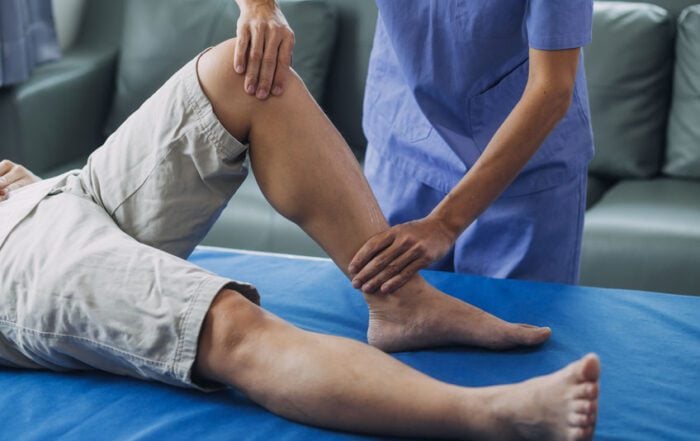What Is Scoliosis And How Does It Affect Teenagers?
Scoliosis is a condition that causes the spinal column to curve into an s-shape. Typically, the spine is straight and bends during movements like stretching or bending. With scoliosis, the spine is constantly curved. Large curves can be very problematic and lead to arthritis, pelvic pain, and lung issues. Scoliosis in children under 18 is called adolescent scoliosis.

Are there different types of adolescent scoliosis?
One of the more common types of scoliosis is adolescent idiopathic scoliosis. Scientists are not sure what causes this condition but notice the disease in children with a family history of scoliosis. Often, adolescent idiopathic scoliosis does not cause severe curving of the spine. Lower back pain is the biggest issue with this condition. Similarly, juvenile idiopathic scoliosis occurs in children between the ages of 3 and 9, and infantile scoliosis affects children under 3. All of these conditions can become severe if left untreated. Early detection is the best way to treat and fix idiopathic scoliosis in children.
How severe is adolescent scoliosis?
The severity of adolescent scoliosis depends on the degree of the curve. Doctors classify curves from mild to severe. Anything less than 20 degrees is considered a mild curve, moderate curves fall in the 25 and 40-degree range while severe curves are greater than 50 degrees.
What are some risk factors for developing scoliosis?
- Being female
Females are more likely than males to develop scoliosis. Taller females are also at greater risk of developing scoliosis. Some researchers believe this issue has to do with the hormone leptin. Leptin regulates food intake and the body’s energy levels. Low leptin levels have been associated with decreased bone mass which can lead to scoliosis development. - Genetic syndrome and developmental delay
Patients with genetic disorders or chromosomal abnormalities are more likely to develop scoliosis. These disorders include Down syndrome. Essentially, developmental delays which cause issues with the natural development process of a child can lead to scoliosis. - Prematurity
Patients born prematurely are at higher risk of developing scoliosis. The spine forms at the same time as other organs, so babies born prematurely may have an underdeveloped spine.
What are the signs of scoliosis?
Once children reach adolescence, some of the signs of idiopathic scoliosis become more pronounced. Doctors can identify these issues during a medical exam. These issues include:
- Uneven shoulder blades
- One hip lower or higher than the other
- Ribs protruding on one side of the body
- One-shoulder blade higher than the other one
One or more of these issues could be a sign that the child has scoliosis. Typically, doctors perform imaging tests like x-rays to confirm the diagnosis. Once diagnosed, doctors will look for treatment options.
Decreasing back pain
For less severe scoliosis issues, doctors won’t recommend any corrective surgery. The hope is that the child outgrows the condition. For more severe cases, doctors can suggest bracing. The brace is customized to the body and worn under clothes. The brace prevents increased curvature of the spine and keeps the spine in a straight position. Doctors also use other methods like physical therapy, exercise, and surgery. Surgery consists of metal implants inserted near the spine to correct alignment. During this procedure, called a spinal fusion, doctors line the spine with bone grafts that fuse with the spine to correct the curvature. The metal rods keep the grafts in place.
Should I talk to a doctor?
Scoliosis in children and teens is a serious issue that requires medical attention. Parents that believe a child may have scoliosis should consult a healthcare professional immediately. Doctors can conduct the proper examination and recommend specialists like orthopedic surgeons to correct the condition.
Recent Posts
ACL Repair: Will You Have Range Of Motion With Your Knee After Recovery & Physical Therapy?
After an ACL injury, ROM can be negatively affected. ACL repair surgery helps restore function, but physical therapy is essential to ROM.
Arthroscopy: What Are The Benefits Of This Minimally Invasive Outpatient Orthopedic Procedure?
Arthroscopy can help diagnose or treat joint conditions. Benefits of the MIS include faster recovery, less pain, and fewer scars.
Posterior Interbody Lumbar Fusion: What Are The Benefits Of PLIF For People With Back Pain?
People with chronic back pain may benefit from posterior interbody lumbar fusion surgery. PLIF can reduce pain and improve stability.
Saying Goodbye To Tonsil Troubles: The Benefits Of Minimally Invasive Tonsillectomy
Chronic tonsilitis or other tonsil troubles can impact health and well-being. A minimally invasive tonsillectomy can reduce infections.
“Dr. Best…is the best!”
“Everyone was friendly and the place was very clean.”
“I liked that it was so clean. Every staff member was pleasant and easy to talk with.”
“Amazing nurses, very caring and friendly and put both me and my son at ease.”
“Everyone was friendly and concerned about my comfort. They frequently asked how I was doing, or if I needed something.”
“Everyone was concerned with my comfort.”
“Rebecca was amazing. I have always had trouble in the past with getting an IV started. I told Rebecca I was concerned about it. She got it on the 1st try – no digging in my arm and NO bruising the next day.”
“All staff were wonderful.”
“Marcia and staff were excellent and genuinely cared for my well being. Wish I could have taken them home.”
“Incredibly professional, friendly and confidence of knowing their roles as healthcare employees. Excellent!”
“Everyone was friendly and the place was very clean.”
“NO wait time, RN Rebecca answered all questions prior to my visit by phone and again answered all questions and concerns while prepping me.”
“Efficiency of the staff. Courteous, friendly and caring attitude. Excellent office staff. Pleasant surroundings.”
“The staff was very polite, they were excellent. They explained exactly what was going on.”
“Dr. Dedhia made everything clear and even scheduled an early follow-up appt so I could get back to work sooner.”
“I liked that it was so clean. Every staff member was pleasant and easy to talk with.”
“Marcia and staff were excellent and genuinely cared for my well being. Wish I could have taken them home.”
“The STAFF from the moment you walk in were the nicest people I’ve encountered at a medical facility.”
“Entire staff was knowledgeable and courteous. They genuinely cared for my well being and made sure my wife and I were taken care of.”
“Dr. Best…is the best!”
“No severe pain – Just a little discomfort – I was asked several times during procedure if I was OK – they showed genuine concern for my well being.”
“Experience was amazing. The nurses my son needed at this time couldn’t have been chosen any more perfect. They were supportive and understanding, patient and just great human beings.THANK YOU KINDLY ”
“Rebecca was amazing. I have always had trouble in the past with getting an IV started. I told Rebecca I was concerned about it. She got it on the 1st try – no digging in my arm and NO bruising the next day.”
“Dr. Tupper was amazing! He spent time explaining exactly what he was doing, what I would experience and made sure I was comfortable.”
“No severe pain – Just a little discomfort – I was asked several times during procedure if I was OK – they showed genuine concern for my well being.”
“Anesthesia staff was outstanding!”
“Entire staff was knowledgeable and courteous. They genuinely cared for my well being and made sure my wife and I were taken care of.”
“Everyone was concerned with my comfort.”
“Experience was amazing. The nurses my son needed at this time couldn’t have been chosen any more perfect. They were supportive and understanding, patient and just great human beings.THANK YOU KINDLY ”
“Dr. Tupper was amazing! He spent time explaining exactly what he was doing, what I would experience and made sure I was comfortable.”
“I can’t say enough about Marcia and the entire team. The care I received was well beyond anything I could have expected.”
“The staff was very polite, they were excellent. They explained exactly what was going on.”
“Dr. Dedhia made everything clear and even scheduled an early follow-up appt so I could get back to work sooner.”
“I can’t say enough about Marcia and the entire team. The care I received was well beyond anything I could have expected.”
“Amazing nurses, very caring and friendly and put both me and my son at ease.”
“All staff were wonderful.”
“Efficiency of the staff. Courteous, friendly and caring attitude. Excellent office staff. Pleasant surroundings.”
“The staff was great, especially Mary and Marcia. Marcia was extremely helpful post-op and made sure I was comfortable and well-cared for.”
“The nurses were very nice and caring!”
“The STAFF from the moment you walk in were the nicest people I’ve encountered at a medical facility.”
“The nurses were very nice and caring!”
“Everyone was friendly and concerned about my comfort. They frequently asked how I was doing, or if I needed something.”
“NO wait time, RN Rebecca answered all questions prior to my visit by phone and again answered all questions and concerns while prepping me.”
“Incredibly professional, friendly and confidence of knowing their roles as healthcare employees. Excellent!”
“Anesthesia staff was outstanding!”
“The staff was great, especially Mary and Marcia. Marcia was extremely helpful post-op and made sure I was comfortable and well-cared for.”
Recent Posts
ACL Repair: Will You Have Range Of Motion With Your Knee After Recovery & Physical Therapy?
After an ACL injury, ROM can be negatively affected. ACL repair surgery helps restore function, but physical therapy is essential to ROM.
Arthroscopy: What Are The Benefits Of This Minimally Invasive Outpatient Orthopedic Procedure?
Arthroscopy can help diagnose or treat joint conditions. Benefits of the MIS include faster recovery, less pain, and fewer scars.
Posterior Interbody Lumbar Fusion: What Are The Benefits Of PLIF For People With Back Pain?
People with chronic back pain may benefit from posterior interbody lumbar fusion surgery. PLIF can reduce pain and improve stability.
Saying Goodbye To Tonsil Troubles: The Benefits Of Minimally Invasive Tonsillectomy
Chronic tonsilitis or other tonsil troubles can impact health and well-being. A minimally invasive tonsillectomy can reduce infections.








